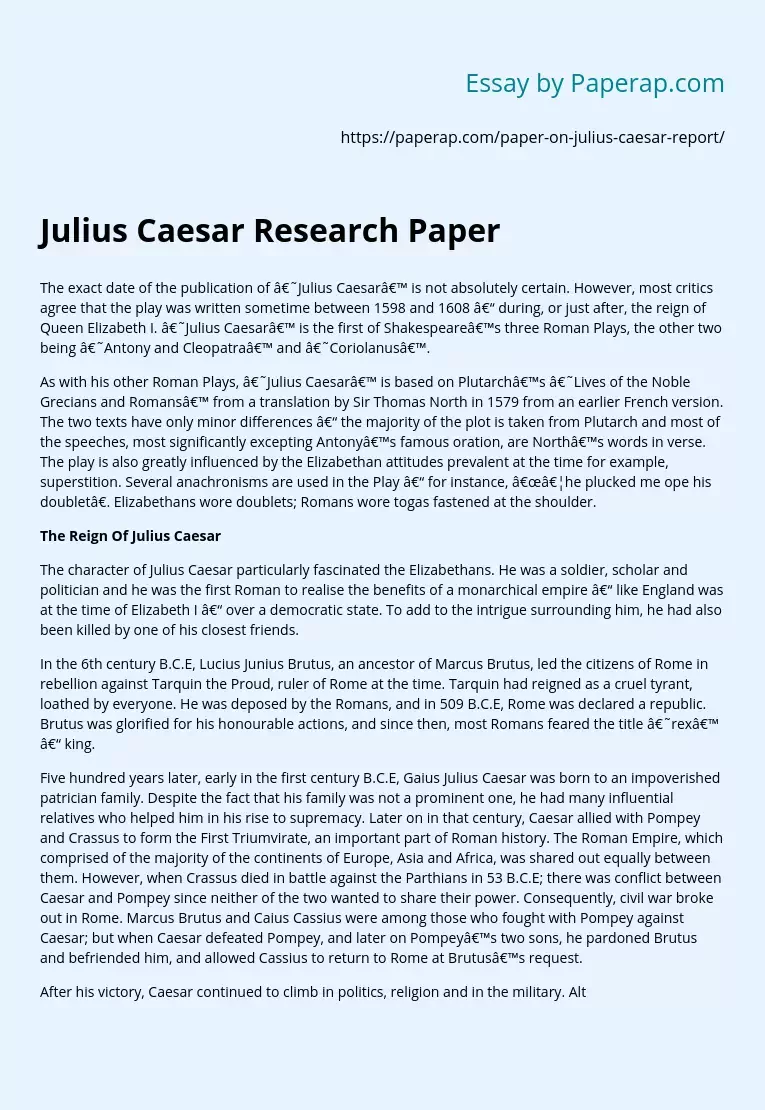Julius Caesar Research Paper
The exact date of the publication of ‘Julius Caesar’ is not absolutely certain. However, most critics agree that the play was written sometime between 1598 and 1608 – during, or just after, the reign of Queen Elizabeth I. ‘Julius Caesar’ is the first of Shakespeare’s three Roman Plays, the other two being ‘Antony and Cleopatra’ and ‘Coriolanus’.
As with his other Roman Plays, ‘Julius Caesar’ is based on Plutarch’s ‘Lives of the Noble Grecians and Romans’ from a translation by Sir Thomas North in 1579 from an earlier French version.
The two texts have only minor differences – the majority of the plot is taken from Plutarch and most of the speeches, most significantly excepting Antony’s famous oration, are North’s words in verse. The play is also greatly influenced by the Elizabethan attitudes prevalent at the time for example, superstition. Several anachronisms are used in the Play – for instance, “…he plucked me ope his doublet”. Elizabethans wore doublets; Romans wore togas fastened at the shoulder.
The Reign Of Julius Caesar
The character of Julius Caesar particularly fascinated the Elizabethans. He was a soldier, scholar and politician and he was the first Roman to realise the benefits of a monarchical empire – like England was at the time of Elizabeth I – over a democratic state. To add to the intrigue surrounding him, he had also been killed by one of his closest friends.
In the 6th century B.C.E, Lucius Junius Brutus, an ancestor of Marcus Brutus, led the citizens of Rome in rebellion against Tarquin the Proud, ruler of Rome at the time.
Tarquin had reigned as a cruel tyrant, loathed by everyone. He was deposed by the Romans, and in 509 B.C.E, Rome was declared a republic. Brutus was glorified for his honourable actions, and since then, most Romans feared the title ‘rex’ – king.
Five hundred years later, early in the first century B.C.E, Gaius Julius Caesar was born to an impoverished patrician family. Despite the fact that his family was not a prominent one, he had many influential relatives who helped him in his rise to supremacy. Later on in that century, Caesar allied with Pompey and Crassus to form the First Triumvirate, an important part of Roman history. The Roman Empire, which comprised of the majority of the continents of Europe, Asia and Africa, was shared out equally between them. However, when Crassus died in battle against the Parthians in 53 B.C.E; there was conflict between Caesar and Pompey since neither of the two wanted to share their power. Consequently, civil war broke out in Rome. Marcus Brutus and Caius Cassius were among those who fought with Pompey against Caesar; but when Caesar defeated Pompey, and later on Pompey’s two sons, he pardoned Brutus and befriended him, and allowed Cassius to return to Rome at Brutus’s request.
After his victory, Caesar continued to climb in politics, religion and in the military. Although formerly two consuls had been elected as prime authority in Rome, Caesar alone ruled now, and as the majority of the Senate were his supporters, any decree he made would be carried out. Caesar was king of Rome – in effect, if not in title.
Several fiercely democratic families realised this and feared a replay of Tarquin’s tyrannical reign. Determined that Rome should remain a republic, a conspiracy of over 60 senatorial families was formed by Brutus and Cassius with the aim of murdering Caesar. To an extent, the plot succeeded. Caesar was assassinated on the 15th of March in the Capitol.
However, far from being regarded as the heroes of Rome, as Lucius Junius Brutus and his followers had been five hundred years back, the conspirators were forced to flee Rome by Antony, Caesar’s close friend, and Octavius, his great-nephew and heir. Once again, civil war broke out in Rome, resulting in the deaths of Brutus and Cassius and most of their army. Antony and Octavius returned to Rome victorious and formed the Second Triumvirate with Lepidus, a general of Caesar’s army.
Eventually, Antony and Lepidus withdrew from the triumvirate and Octavius alone was left to rule the great Roman Empire. He adopted his great-uncle’s name ‘Caesar’ along with the name ‘Augustus’. He was now known as Augustus Caesar, and to this name he also added the title of ‘Princeps’ – the chief one. From then on, Rome officially ceased to be a republic.
Julius Caesar Research Paper. (2019, Dec 05). Retrieved from https://paperap.com/paper-on-julius-caesar-report/

